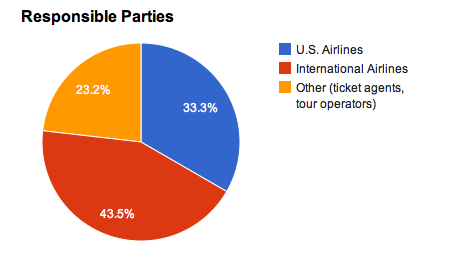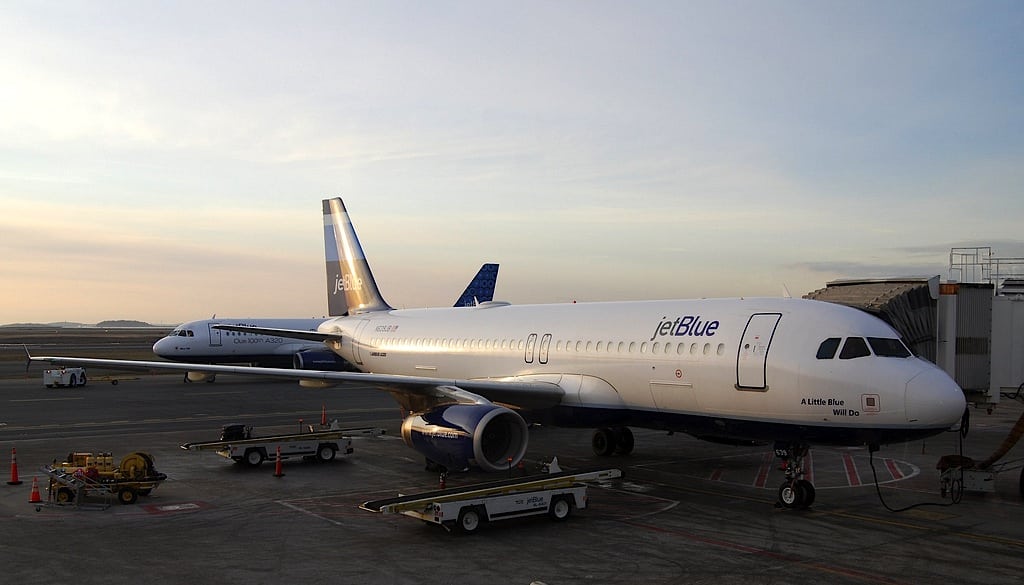Skift Take
This U.S. Department of Transportation has passed the most consumer-friendly regulations in the history of U.S. aviation, but that doesn't stop airlines from breaking the rules.
The Department of Transportation levied $3.6 million in penalties for violations of air travel consumer-protection rules in 2012.
This is $300,000 more than 2011 and more than double the fines levied in 2010. The number of enforcement orders has more than doubled in just three years.
The reason for the jump in both the number of fines and the amounts levied is due to the introduction of two consumer protection rules starting in 2009. The first ruling limited the amount of time that a U.S. carrier could remain on the tarmac before deplaning passengers to three hours. It also required airlines to display flight delay information on their websites and adopt customer service plans.
The number of tarmac delays longer than three hours dropped by 648 to only 16 incidents in the first full 10 months, May 2010 to February 2011, that the rule was in effect.
A second rule in 2011 extended the time limit on tarmac delays to include a four-hour cap for foreign carriers. The rule also required airlines to refund passengers for lost bags, fully disclose all fees in online transactions, and compensate passengers when bumped from a flight.
The total number of enforcement orders and total fines levied hit record highs in the years following the new legislation. The fines hit legacy carriers from the U.S. and abroad, and small air travel operators of charter flights and aircruises.
The Department of Transportation says in a statement, “Our vigorous activity in aviation enforcement is a reflection of the high priority the U.S. Department of Transportation places on protecting air travelers. Passengers deserve to be treated with fairness and respect every time they travel, which is why we’ve issued two major airline consumer protection rules, and we have closely monitored the industry’s compliance with these rules.”
| Year | Number of Fines | Total Amount Levied | Average Fine |
|---|---|---|---|
| 2003 | 13 | $385,000 | $29,615 |
| 2004 | 9 | $250,000 | $27,777 |
| 2005 | 11 | $1,704,000 | $154,909 |
| 2006 | 12 | $649,000 | $54,083 |
| 2007 | 12 | $568,000 | $47,333 |
| 2008 | 16 | $880,000 | $55,000 |
| 2009 | 19 | $2,222,000 | $116,947 |
| 2010 | 28 | $792,000 | $64,000 |
| 2011 | 47 | $3,264,000 | $69,446 |
| 2012 | 49 | $3,610,000 | $73,673 |
What happened in 2012
International airlines were responsible for the largest number of violations in 2012, followed by U.S. carriers, and finally ticket agents and tour operators.
The largest number of fines violated US Code – Section 41712, which prohibits carriers and ticket agents from engaging in an “unfair or deceptive practice or an unfair method of competition in air transportation or the sale of air transportation.” This broad statement includes the failure to notify a consumer of the expiration date of a ticket bought online, the name of the carrier operating a flight; or failure to display either of these facts on the first web page following an itinerary inquiry.

The second and third most common violations related to airlines’ failure to code, record, and respond to disability-related complaints, and foreign carriers’ carriage of local traffic for compensation or hire between two points in the U.S., also known as cabotage.
For example, the Ukranian airline AeroSvit Airlines paid a civil penalty of of $20,000 for failing to file annual reports detailing disability-related complaints that it received from passengers in 2008 and 2011.
Price advertising regulations that require the entire price of airfare, plus taxes, to be displayed online and prohibit the advertisement of each-way airfare if only available when purchased for round-trip travel were also common violations.
Only two airlines were fined for violating limitations on tarmac delays in 2012. Copa Airlines of Panama was fined $150,000 for leaving passengers aboard an aircraft at New York’s JFK airport for five hours and 34 minutes in June. Virgin America was fined $55,000 for failing to notify passengers in an aircraft at Chicago’s O’Hare airport that was delayed for two hours and 16 minutes that they could leave the aircraft prior to its eventual departure to San Francisco.
Virgin America was fined twice in 2012 for total of $155,000 in violations, as was Qantas, which paid total of $140,000. Each of the major online ticket agents including Orbitz, TripAdvisor, and Travelocity were each charged once.
In the following pie chart, we assess how many times airlines were charged for a certain violation rather than how much money was owed since an airline or website could owe one amount for several violations.
Moving forward
Violations are clearly still occurring despite Secretary of Transportation Ray LaHood pushing hard for the most consumer-friendly laws the U.S. aviation industry has ever seen.
William McGee, author of Attention All Passengers and aviation activist says, “These fines have the same effect as a police car on a highway – pull over one guy and everyone else slows down. If one airline is fined for a tarmac delay, it sends a very strong sign to all the other airlines.”
It might be a few years before airlines put in place measures to avoid the fines completely; however, the industry’s current trajectory could be interrupted if Secretary LaHood does not stay on for President Obama’s second term. Speculation in Washington isn’t looking good for LaHood-lovers.
The Daily Newsletter
Our daily coverage of the global travel industry. Written by editors and analysts from across Skift’s brands.
Have a confidential tip for Skift? Get in touch
Tags: dot, fines, flight delays, lahood
Photo credit: JetBlue was the poster child for tarmac delays in 2007, and DoT became a lot more activist after that. Bill Abbott / Flickr

